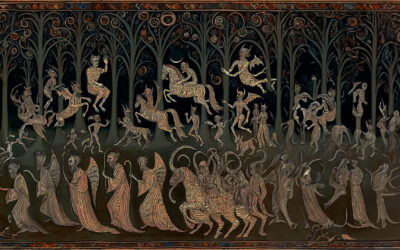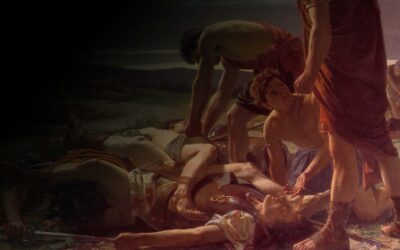Contents
Introduction
You have probably heard about Hannibal and his elephants, battles, triumphs, defeats, and the absolute terror he invoked in the Romans. But do you know how his story ends?
A masterpiece
During the reign of Augustus, a massive work, a monumental masterpiece on Roman history, was written that was to span over 142 books. Beginning with the foundation of Rome in 753 B.C., it continues on all the way through to Augustus himself. The work is known as Ab Urbe Condita.
The man who wrote this masterpiece was none other than Titus Livius or Livy. And though his work gives us great insight into Roman history or Roman history as it was seen through the eyes of a Roman author during the reign of Augustus, we know very little about the author himself.
A celebrity
He was born in Patavium, modern Padua in northern Italy, in 59 or 64 B.C. but spent a large part of his life in Rome. Although at the time of his death, he was back in Padua. He held no government positions but seems to have been quite a famous writer even in his own time. He is primarily known as a historian but also produced rhetorical and philosophical works, dialogues, and advice in the form of a letter to his son. None of these other works have survived to our time—as far as we know :).
So famous was Livy, if we are to believe a letter from Pliny (Ep. 2.3.8) that an admirer of Livy’s traveled all the way from Cadíz in Spain to Rome (that would be about 2500 km or 1550 miles) only to see his idol.
This is roughly what we know about the author of Ab Urbe Condita, a work that every Latin student is confronted with at one point or another.
So why all this? What has this to do with Hannibal?
Out of the 142 books which make up Ab Urbe Condita, only books 1–10 and 21–45 have survived history’s harsh treatments. We have a few summaries and fragments from the rest, but, alas, the rest is sadly lost to time: vae tempori librorum edaci!
In one of the surviving books, nr 39, chapter 51 to be exact, we find the story about Hannibal’s final hours.
Before The End
We shall not go into details of all the battles of general Hannibal Barca, nor how close he came to destroy the city of Rome. Instead, to give you some context to the passage we’re concerned with today, we shall briefly focus on where he was and why he was there, at the brink of his own death.
At the end of the Second Punic War, Hannibal returned to Carthage. However, the Romans were not ready to forget and wanted him arrested. Hannibal thus left Carthage for Tyre on the coast of Lebanon, then to Antioch and later onwards to Ephesus (on the west coast of modern Turkey), to be the counselor of King Antiochus II. After having suffered defeat in several naval battles against Rhodes and the Romans, Hannibal feared that he would be turned over to the Romans and fled.
Hannibal now found himself in Bithynia (northwestern Turkey) and under the protection of King Prusias, who at the time was fighting one of Rome’s allies, King Eumenes II of Pergamon. Hannibal thus went to fight against Eumenes on behalf of his protector.
This is where we are at when the end draws near for Hannibal:
The Romans stepped into the war between Prusias and Eumenes, and as they were still hunting Hannibal, they threatened king Prusias so that he might give him up.
And here begins Livy’s story, which we shall now treat. Below you will find a video in which Daniel Pettersson recites Livy’s Latin text. Below you will also find the written Latin text and an English translation.
Latin Video
Audio only
Listen to the audio only here or in your podcast app.
Latin text
Mors Hannibalis, Ab Urbe Condita (Liv., 39, 51)
Ad Prūsiam rēgem lēgātus T. Quīnctius Flāminīnus uēnit, quem suspectum Rōmānīs et receptus post fugam Antiochī Hannibal et bellum aduersus Eumenem mōtum faciēbat.
Ibi, seu quia ā Flāminīnō, inter cētera, obiectum Prūsiae erat hominem omnium, quī uīuerent, īnfēstissimum populō Rōmānō apud eum esse, quī patriae suae prīmum, deinde frāctīs eius opibus Antiochō rēgī auctor bellī aduersus populum Rōmānum fuisset; seu quia ipse Prūsiās, ut grātificārētur praesentī Flāminīnō Rōmānīsque, per sē necandī aut trādendī eius in potestātem cōnsilium cēpit; ā prīmō colloquiō Flāminīnī, mīlitēs extemplō ad domum Hannibalis cūstōdiendam missī sunt.
Semper tālem exitum uītae suae Hannibal prōspexerat animō et Rōmānōrum inexpiābile odium in sē cernēns, et fideī rēgum nihil sānē cōnfīsus: Prūsiae uērō leuitātem etiam expertus erat; Flāminīnī quoque aduentum uelut fātālem sibi horruerat.
Ad omnia undique īnfēsta ut iter semper aliquod praeparātum fugae habēret, septem exitūs ē domō fēcerat, et ex iīs quōsdam occultōs, nē cūstōdiā saepīrentur. Sed graue imperium rēgum nihil inexplōrātum, quod uestīgārī uolunt, efficit.
Tōtīus circuitum domūs ita cūstōdiīs complexī sunt, ut nēmō inde ēlābī posset. Hannibal, postquam est nūntiātum mīlitēs rēgiōs in uestibulō esse, postīcō, quod dēuium maximē atque occultissimī exitūs erat, fugere cōnātus, ut id quoque occursū mīlitum obsaeptum sēnsit et omnia circā clausa cūstōdiīs dispositīs esse, uenēnum, quod multō ante praeparātum ad tālēs habēbat cāsūs, poposcit.
‘Līberēmus’ inquit ‘diuturnā cūrā populum Rōmānum, quandō mortem senis exspectāre longum cēnsent. Nec magnam nec memorābilem ex inermī prōditōque Flāminīnus uictōriam feret. Mōrēs quidem populī Rōmānī quantum mūtāuerint, uel hic diēs argūmentō erit. Hōrum patrēs Pyrrhō rēgī, hostī armātō, exercitum in Italiā habentī, ut ā uenēnō cauēret praedīxērunt: hī lēgātum cōnsulārem, quī auctor esset Prūsiae per scelus occīdendī hospitis, mīsērunt.’
Exsecrātus deinde in caput rēgnumque Prūsiae, et hospitālēs deōs uiolātae ab eō fideī testēs inuocāns, pōculum exhausit. Hic uītae exitus fuit Hannibalis.Join our Newsletter because we send out tips, updates and learning material.
English translation
Prusias had for some time fallen under suspicion in Rome, partly owing to his having sheltered Hannibal after the flight of Antiochus and partly because he had started a war with Eumenes. T. Quinctius Flamininus was accordingly sent on a special mission to him. He charged Prusias, amongst other things, with admitting to his court the man who of all men living was the most deadly foe to the People of Rome, who had instigated first his own countrymen and then, when their power was broken, King Antiochus to levy war on Rome. Either owing to the menacing language of Flamininus or because he wished to ingratiate himself with Flamininus and the Romans, he formed the design of either putting Hannibal to death or delivering him up to them. In any case, immediately after his first interview with Flamininus he sent soldiers to guard the house in which Hannibal was living.
Hannibal had always looked forward to such a fate as this; he fully realised the implacable hatred which the Romans felt towards him, and he put no trust whatever in the good faith of monarchs. He had already had experience of Prusias’ fickleness of temper and he had dreaded the arrival of Flamininus as certain to prove fatal to himself.
In face of the dangers confronting him on all sides he tried to keep open some one avenue of escape. With this view he had constructed seven exits from his house, some of them concealed, so that they might not be blocked by the guard. But the tyranny of kings leaves nothing hidden which they want to explore. The guards surrounded the house so closely that no one could slip out of it. When Hannibal was informed that the king’s soldiers were in the vestibule, he tried to escape through a postern gate which afforded the most secret means of exit. He found that this too was closely watched and that guards were posted all round the place. Finally he called for the poison which he had long kept in readiness for such an emergency.
“Let us,” he said, “relieve the Romans from the anxiety they have so long experienced, since they think it tries their patience too much to wait for an old man’s death. The victory which Flamininus will win over a defenceless fugitive will be neither great nor memorable; this day will show how vastly the moral of the Roman People has changed. Their fathers warned Pyrrhus, when he had an army in Italy, to beware of poison, and now they have sent a man of consular rank to persuade Prusias to murder his guest.”
Then, invoking curses on Prusias and his realm and appealing to the gods who guard the rights of hospitality to punish his broken faith, he drained the cup. Such was the close of Hannibal’s life.
Translated by Rev. Canon Roberts (1912).
















